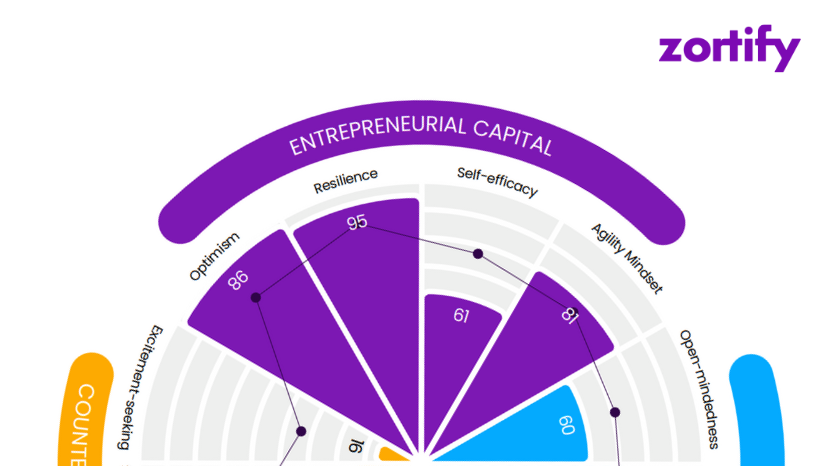“I can do it!”

Founders are characterized by optimism, resilience and self-efficacy conviction. All values are measurable and trainable. Why is that?
Successful founders have strong personal resources. They are particularly optimistic, resilient and at the same time convinced of their own effectiveness. This entrepreneurial capital can be measured, and trained in every person.
Nurturing Entrepreneurial Capital in the face of uncertainty
Around one in ten of the working population in Germany is self-employed.[1] Crises such as the current Corona pandemic hit the self-employed particularly hard. Because they bear the full risk for their entrepreneurial activities. But even before Covid-19, it was true that anyone who wants to realize their own business idea in today’s volatile world needs psychological “capital” from which he or she can draw in difficult phases.
Self-employed people in particular often make risky decisions, work in a complex business environment and have to deal with an uncertain future. At the same time, in the best case, they consistently pursue their vision and also motivate their own employees. How do successful founders manage all this at the same time? The answer: with the help of their entrepreneurial capital, which they carry on their shoulders like an imaginary “resource backpack. This mental capital can be measured – and trained. An analysis offers an important starting point for making existing resources visible and expanding them.
The influence of entrepreneurial capital on business success can explain why relatively few people start up businesses in Germany, even though, according to the Global Entrepreneurship Monitor, many today consider themselves qualified enough and see opportunities to build up their own company. For the support and promotion of innovations and the start-up scene, therefore, the development of entrepreneurial capital is also an important adjusting screw.
What personality traits does entrepreneurial capital comprise?
Entrepreneurial capital forms the basic psychological framework for a successful and satisfied working life. It is based on the concept of “psychological capital,” which is increasingly in focus in psychological research, and comprises certain cognitive resources from which a person can draw to influence his or her own well-being.
These resources are more stable than emotions or moods but at the same time malleable and open to development. A high expression of the interacting resources is related to higher performance, job satisfaction, and psychological well-being. Conversely, individuals with low levels of psychological capital exhibit increased cynical behavior, job stress, and anxiety.
Current research shows that successful founders are particularly convinced of their own effectiveness, resilient as well as optimistic – and significantly higher than their own top managers. These three personality traits form the entrepreneurial capital of each person and, in their interplay, have a significant influence on professional success and job satisfaction:
Factor 1: Self-efficacy beliefs.
An unwieldy word with a strong impact. It refers to confidence in oneself and one’s own abilities to successfully complete tasks. People with a high level of self-efficacy set themselves ambitious goals and can control their own motivation. Even in difficult situations, they do not bury their heads in the imaginary sand. But try to master them as well as possible. Studies show that mastering challenging experiences and social persuasion promote the development of one’s own self-efficacy conviction.
Successful founders are convinced of their own effectiveness.
We know from our everyday life that a person’s actual competence and self-confidence do not always match. There are enough people who believe themselves to be less capable than they actually are – and vice versa. For founders as well as for employees, confidence in one’s own abilities is always an important resource. It helps not only in turbulent times, but also when leading a team or presenting one’s own ideas.
Factor 2: Personal resilience
Let’s imagine the following situation: A pandemic spreads worldwide and investors bail out. A worst-case scenario. However, unexpected events are not only part of building a business in pandemic times. As a rule, a start-up is always associated with a high degree of risk and uncertainty – failure and decisions with a bad outcome are often part of it. In addition, the responsibility increases the larger a start-up becomes. How do successful founders respond to such challenges?
Successful founders show a high level of resilience and deal calmly with unexpected events.
Successful founders show a high level of resilience: they accept reality as it is, tend to improvise, take risks and face challenges with openness. Those who are resilient get back up more quickly after setbacks and failures, cope better with conflicts and deal more calmly with uncertainties. Stumbling blocks? They are much less likely to throw resilient people off track. And if they do fail, they get back on their feet quickly and often recover at an even higher level of their personal self. People with high resilience focus either on their available resources, on the potential risks, or on the process itself, and aim their strategy at achieving the best possible outcome.
Factor 3: Optimistic attitude
Successful founders show a strong basic confidence in a positive future. They see and seize opportunities before others do and thus usually enter “error-prone” new territory. Optimists, however, tend to forgive themselves for mistakes more easily and to see opportunities even in the face of great uncertainty. Instead of being intimidated by possible failure, they believe in the success of their plans.
Looking on the Bright Side – successful founders are particularly optimistic.
What exactly makes an optimist “tick”? Research shows that they explain positive events with personal and lasting causes. In contrast, they attribute negative events to external, temporary and situation-specific causes. The world is perceived as a place where good things happen to you on a regular basis.
How can entrepreneurial capital be measured?
Zortify has developed a scientifically based test that uses artificial intelligence to evaluate a person’s entrepreneurial capital. The algorithm analyzes personality traits based on answers to self-assessment questions and freely formulated texts.
The special feature of AI-based text analysis is that it incorporates non-manipulable results into the evaluation, thus ensuring high validity of the test results. While the subjectivity of reviewers* cannot be completely ruled out, the use of AI technology enables objective and precise results to recognize and harness one’s own potential.
“Self-awareness is the most important cornerstone of emotional intelligence.” Daniel Goleman
What is the benefit of the analysis?
Knowledge about the individual characteristics of entrepreneurial capital provides an important basis for reflection and expands the options for action for guided personality development. The test results can be used to work out clearly defined topics in a coaching session. Previous research has shown that even one to three hours of highly focused microinterventions not only lead to a significant improvement of one’s own mental resources. But also to an increase in performance at one’s own workplace.
It is not only important for the self-employed and founders to invest in their entrepreneurial capital. The analysis provides a good basis for further training offers or decisions about financial support. For example, students with high entrepreneurial capital and a strong interest in entrepreneurship can be filtered and supported with a tailored educational program.
By fostering entrepreneurial capital, HR development can also help managers and employees* become more resilient, more optimistic about the future, and more confident in seeking alternative approaches in a volatile work environment. A transparent, supportive leadership style has an influence on the psychological capital of employees. And this, in turn, determines whether employees leave a company quickly or remain motivated in the long term.
Whether a founder, manager or employee – recognizing and promoting one’s own entrepreneurial capital helps people achieve their own goals and gives them the opportunity to adapt more easily, overcome difficulties and strengthen their mental well-being.
[1] Source: German Federal Statistical Office (Microcensus 2018)
Prof. Dr. Florian Feltes
Prof. Dr. Florian Feltes is co-founder and co-CEO of zortify and a forerunner in AI-supported HR innovation. Together with his team, he develops intelligent personality diagnostics and helps companies identify the perfect candidates—without expensive assessments and without bias. His vision: a world in which every company can effortlessly form high-performance teams and create work environments that allow human potential to flourish.


Why should psychology be considered in due diligence?

Why Due Diligence matters: The importance of personality analysis in investment decisions
